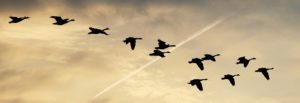The BEMA (βῆμα, בּימה)
I stepped out on an overcast, moonlit night this fall. Then, I heard them: A few tentative honks, followed by a chorus of replies. The sound briefly filled the skies as the flocks headed South. I felt the tug at my heart that I always get when I hear the geese. Some part of me wants to go with them, to fly above the clouds and wing my way somewhere else, far away.
There may be a deep cultural or even genetic reason for this: my Gaelic heritage has long associated the goose in flight with the mysterious coming of the Spirit of God. It is an ancient spiritual teaching of the Celtic church, often found in their art. When I lived in Scotland, I was able to visit one of the oldest missions in Scottish history, Iona, off the coast of Mull. Ten years later, I brought my family there to experience the same blend of brilliant, transcendent light on giant stone Celtic crosses, white marble beaches and sea-mist vistas with a soundscape of gull cries and crashing waves. The symbol of the Iona Community today is the wild goose in flight. It reminds me of the mystery of migration: where do the geese go, and how do they know when and where to fly, and when will they come back? What have they seen? What could, or can, they teach us? And it leads me to meditate on the mysteries of how God gets to us.
In the Middle East, the Hebrews knew the flights of the Dove, and their soft cooing reminded them that the voice of God can be gentle, soft, soothing, and sometimes very hard to hear. In Scotland, and here in Northern Alberta, the faint honks at a distance can give us the same message: pay attention, the times and the seasons are changing, life is shifting, and some things familiar are going away for a while. Are we ready? God will not always, if ever, be shouting at us, or speaking in loud voices and technicolour visions, or making things obvious in detailed sermons and lectures. In fact, God seems to avoid making things too obvious, too loud, and too intrusive. My words are for those that have ears to hear, Jesus said. Have I been or, am I, paying attention?

How will I live under the quieter skies of winter? There are other birds to heed who remain: ravens, crows, the birds of scarcity and craftiness. They have their own messages, too. But I also know that while the geese are flying long distance (in Gaelic those two words are a phrase for sailing the wild and treacherous courses off Skye and the Hebrides) they depend on their God-given inner compass and instinctive understanding of flight dynamics (remember, they fly a V formation?). Is my spirit prepared for my own long duration through darker and colder days, living on stores of truth, wisdom, song and prayer, while I wait for the first faint cry of the goose that heralds the spring? It is no coincidence that Pentecost, the annual festival of the coming of the Holy Spirit is usually when the wild geese, too, have announced their return.
Does their flying long distance call attention to my own preparations for the times in life when I am going to be sailing long distance through life’s tough passages? How is my own inner spiritual compass? Have I tended my place in the flock so that I can fly better and with less turbulence, and make it easier for those in my wake?
And what about my capacity for hope? I know that I am actually, if unconsciously, counting on the return of the wild geese. I am so delighted to hear the first goose in spring that I realize how much my spirit counts on hearing from God. The return of the geese confirms my faith that God is in charge of the world, that even when we “two-legged” are making a hash of things, the world of fish, fowl and animals is obeying their Creator, bringing glory to the fundamental power of the universe’s will to love and create. And it reminds me to hope – to count on – the return of the Spirit to my own heart when it needs thawing.
You don’t have to have indigenous Gaelic blood to pray (in the words of Joan Hogg, an Irish songwriter), as I did on the shores of Iona, “Here I stand, looking out to sea, and I pray a prayer, that the Wild Goose will come to me”. Perhaps in your own attending to the change in season and adjusting to the new weather (and it’s many hassles!) you will hear the quiet reminders to pay attention to God and prepare for winter. And never give up hope in Spring.
